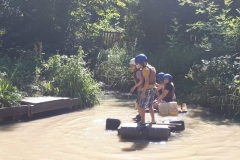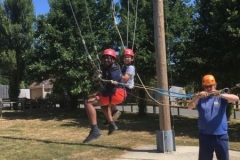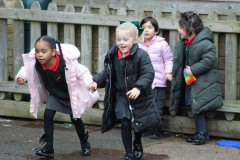



¬ BACK TO MAIN CURRICULUM PAGE

Through science at Farnborough, we want to enable our children to have a greater understanding of the world around them. We aim to develop our children’s ‘sense of excitement and curiosity about natural phenomena’ through different learning experiences, which encourage our children to investigate, research, and reason about the world around them.
We want our children to become curious and inquisitive learners who can understand how science can be used and the significant role it has in our lives as well as its continuing importance in solving global challenges such as climate change. We want our children to understand how science provides the foundations for developing essential skills for a wide range of diverse and valuable careers beyond the classroom and encouraging our children to dream big to make a difference to the world around them.
Our science curriculum, which aligns with the national curriculum, provides a high-quality science education with foundations to develop a deep understanding of scientific concepts for understanding the world through the specific disciplines of biology, chemistry and physics preparing the children for science beyond the primary classroom. Our science curriculum influences our children’s scientific aspirations and encourages them in their future learning.
Scientific learning begins in EYFS with ‘understanding the world’. As our children develop their wide range of vocabulary this area of learning provides a number of rich contexts for the children to apply this to. From this very early stage in the children’s scientific journey, scientific vocabulary is explicitly taught, and they are given the time to develop their ‘science talk’ allowing them to orally rehearse and structure their thoughts using scientific language clearly and precisely in their scientific discussions. This development of language and vocabulary acts as ‘seeds’ for developing the children’s understanding of scientific concepts which are gradually built upon.
All science topics all focus on ‘Big questions’, which encourage the children to be active learners and apply their subject skills, knowledge and understanding in a way that develops independence within the subject.
Our curriculum develops through sequenced lessons that build upon the children’s learning with increasing depth and challenge as children move through the year groups. Our lessons teach our children both ‘substantive’ knowledge (science theories) and ‘disciplinary’ knowledge (science practices) allowing our young scientists to establish scientific knowledge to develop an understanding of how these two types of knowledge work together to help them ask and answer scientific questions.
The lessons encourage children to make connections between prior knowledge and experience. Children develop a connected knowledge base over time, where new knowledge is linked to prior learning, making this meaningful. Knowledge is broken down into manageable ‘chunks’ of content which breaks down complex ideas and theories allowing the children to develop their own knowledge and understanding within each scientific discipline.
Children are taught to understand how science can be used to explain what is occurring, predict how things will behave, and analyse causes and trends through high-quality practical work which allows the children to apply their knowledge and build on what they already know.
Practical work is always carefully selected to ensure it supports children in interpreting and explaining the observations and measurements they have made as well as how it supports their understanding of substantive knowledge.
Cross curricular opportunities with mathematics is carefully planned to ensure the children have been taught the required skills and knowledge to enable them to apply this in a scientific context, for example when measuring and analysing data.
Through carefully planned and sequenced lessons our children develop both their substantive and disciplinary knowledge selecting the most appropriate scientific skills, such as predicting, classifying, observing, questioning, measuring, recording, and presenting evidence, drawing conclusions, and evaluating their findings to support the learning substantive knowledge. This allows our children to develop their ability to raise further questions and challenge their findings.
We frequently check the children’s understanding to identify gaps and misconceptions as well as giving the children subject specific feedback both verbally and written so that they know how to make progress within science this allows our children to become motivated and take ownership of their learning within science.
Science at Farnborough is an enquiry-based subject which is underpinned by both substantive and disciplinary knowledge that allows our children to make sense of the world around them. It is a high-quality curriculum which allows our children to develop an authentic understanding of what science is and the impact that it has on their lives and their futures.
The knowledge within our science curriculum are the building blocks for developing the children’s understanding of complex scientific theories which will inspire and motivate them. Our children will develop a wide range of scientific skills (disciplinary knowledge) and knowledge (substantive knowledge) through quality first teaching which is adapted to ensure we have ambition for of all our pupils to make strong progression over their time at Farnborough.
Year on year the children’s knowledge both substantive and disciplinary continues to be built upon creating a bank of knowledge in the children’s long term memory, enabling them to learn more and remember more as the quantity and complexity of scientific concepts develops.
Our children will be motivated by the curriculum developing a curiosity for understanding the world around them through a curriculum that builds on and embeds knowledge in a sequential way. Our children, through their learning, will develop a rich scientific vocabulary giving a variety of opportunities to apply their scientific knowledge and understanding through practical engagement. The children will develop an enjoyment and enthusiasm for science enabling children to understand the importance of science in the real world.
All children at Farnborough will have: